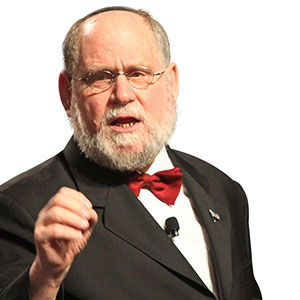
Martin Rapaport has made a number of fiery denunciations about lab-grown diamonds, so when I heard that he spent his annual JCK Las Vegas breakfast speech lambasting De Beers, I thought he had taken the company to task for Lightbox. But no, he only touched on that topic—and hailed De Beers’ approach as “brilliant”—and was angry about a different, if still important, issue: De Beers’ reluctance to let retailers and manufacturers identify the source of De Beers–mined goods as from the company. (The speech can be watched here and is also embedded at the end of the post.)
I wrote about De Beers’ policy last year. As I said then, while I understand its desire to protect its brand, I consider its policy here to be shortsighted and nontransparent. Further, it makes even less sense in light of De Beers’ blockchain project, Tracr, which will be administered by the overall industry. As part of that, De Beers, at a recent JCK Las Vegas seminar on blockchain. said it is willing to identify a stone’s country of origin. (See clarification below.)
At this breakfast, Rapaport blasted the policy, turning up the rhetoric up to 11:
When you deny [the industry] the ability to identify where our diamonds come from—and I’m talking about 43 percent of the legitimate diamonds in the world—you are saying, “Nobody can know where the diamonds are coming from but us, De Beers.” …
De Beers is proactively destroying transparency and making source verification impossible. And yet they parade around here like they’re good guys. They are not good guys. This is the mother of evil.…
De Beers no longer leads the diamond industry. They lead De Beers. Their interests are not aligned with ours.
He said De Beers’ policy is “a tool, a device, it’s a way to monopolize” and said it should “expect an antitrust investigation” on this policy. “I will make sure it happens,” he said, and added he hopes to prevent De Beers from operating in the United States.
In a relatively uncharacteristic move—especially given how often it takes its lumps in consumer media—De Beers responded to Rapaport’s remarks two days later:
On 3 June, Martin Rapaport used his annual breakfast presentation at JCK to attack the integrity of every employee of De Beers Group, yet he invited no employee of De Beers Group to offer a different point of view.….
We refuse to submit to a world in which he who shouts loudest wins. What Martin wants is to be able to market diamonds from De Beers Group, using the De Beers brand, on his platform for his benefit. We don’t think this is fair, and we told him so….
Martin had planned to use the JCK Show to discuss his source certification. We engaged with Martin multiple times over several weeks, but when we did not comply with his wishes, he threatened us repeatedly. We were unmoved and we continue to be so.
We understand that people of goodwill may disagree with our position, but that doesn’t excuse emotionally charged and baseless accusations….
In a later Facebook post in response to criticism of his remarks, Rapaport said, “We did not need to use the De Beers name to identify the legitimacy of their goods. We suggested that they could invoice using DTC or any other trade name. We have never asked De Beers to use their brand or had a desire to involve ourselves with the De Beers brand. Statements to the contrary by De Beers are false.”
This wasn’t the only issue discussed at the breakfast. It also featured an excellent video on the Peace Diamond auctioned by Rapaport and a well-worth-watching speech by the Sierra Leone minister of mines and mineral resources Dr. Morie Manyeh, which can be seen at the breakfast video starting at 19:35.
Here is a sample of Dr. Manyeh’s remarks:
For all of the diamonds that have come out of our country, it is hard to see how little we have benefited. You see [diamond-rich] Koidu village. No water. No electricity. The school is nothing to write home about.… We are saying to the world, this [new] government headed by President [Julius] Maada Bio, is saying to the world, “Give us a chance please. We are seeing, help us stand on our own two feet. We are tired of handouts from donor countries.…
Botswana is what it is today. They have managed their diamonds better than we have.… We want schools, we want hospitals, we want good roads….
The diamonds that come from us will enable our people to have a better life.… The potential for diamonds and the diamond industry in [the] Kono [district] is huge.… We invite you to partner with us, work with us, and let us give a human face to the diamond industry.… Let us all, as human beings first, and businessmen and -women next, let us all work toward giving Sierra Leone a chance to stand on its own.
In a world where the loudest voices do in fact often carry the day, here’s hoping the minister’s soft-spoken entreaties will still reach a large number of ears.
Clarification: De Beers has said that it is willing to identify country of origin on its diamonds with Tracr, but not mine of origin for the moment.
- Subscribe to the JCK News Daily
- Subscribe to the JCK Special Report
- Follow JCK on Instagram: @jckmagazine
- Follow JCK on X: @jckmagazine
- Follow JCK on Facebook: @jckmagazine